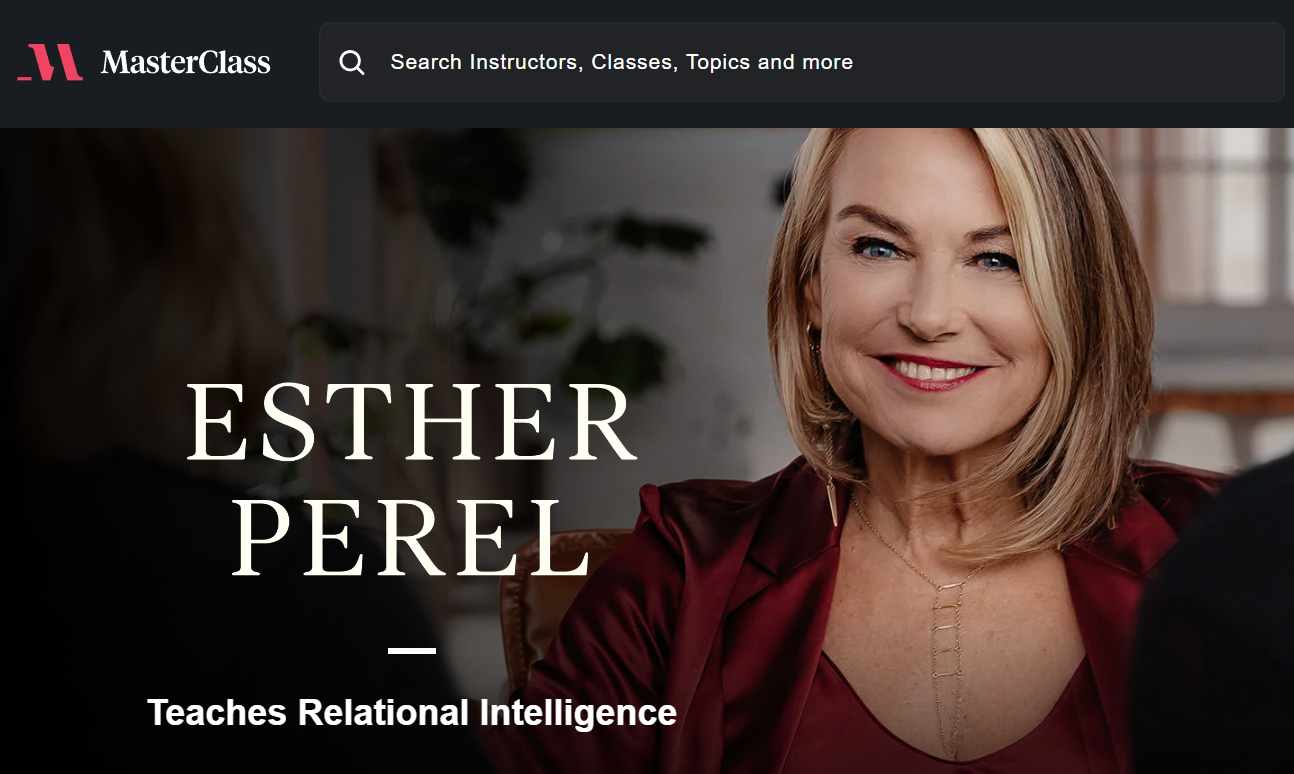The standard of {our relationships} determines the standard of our lives. What’s relational intelligence and why is it vital? Let’s talk about it…
All of us must work together with others each day.
And there is a sure kind of intelligence that determines the success of your interactions…
It is known as relational intelligence.
Let’s talk about what relational intelligence is and why it is an space of non-public growth that we should always all take note of.
This submit might comprise affiliate hyperlinks. Please learn my disclosure for extra data.
What’s Relational Intelligence?
Contents
Relational intelligence is the set of abilities we use to navigate {our relationships} and join with others.
I first found the idea of relational intelligence after I watched Esther Perel’s Masterclass on Relational Intelligence, which I extremely advocate.
On this Masterclass, Famend psychotherapist Esther Perel teaches you the ability—and the artwork—of connecting with others.
Many individuals are conversant in the idea of emotional intelligence.
What is the distinction between emotional intelligence and relational intelligence?
Emotional intelligence is a element of relational intelligence.
Nevertheless, in comparison with emotional intelligence, relationship intelligence focuses on a systemic strategy.
Relational intelligence pertains to the human capability to attach with others particularly inside familial, societal, and
cultural techniques.
As you develop your relational intelligence, your skill to deeply perceive your dynamics with others will improve – and so will the chance to navigate them extra successfully.
On this article, I’ll cowl three facets of relational intelligence I discovered very fascinating from watching Esther Perel’s Masterclass.
I believe they assist to broaden on the reason of what relational intelligence is.
Three Features of Relational Intelligence
Establishing Boundaries
Typically there’s a false impression that if individuals have boundaries, it prevents them from connecting.
Nevertheless, it’s as a result of we’ve boundaries that we acquire a way of tips on how to join with one another.
Simply as pores and skin covers the human physique, boundaries are the “pores and skin” that envelops relationships.
In Esther Perel’s MasterClass on Relational Intelligence, she talks about 3 sorts of boundaries:
Inflexible Boundaries
In relationships:
A inflexible boundary in a relationship can’t bend. At finest,
it divides; at worst, it breaks. Relationships with inflexible boundaries battle to
enable outsiders in or out; they allow individuals to be self-directed but in addition disconnected.
Particular person:
You probably have a inflexible private boundary, you might be walled off. You retain others at a distance—or
lower them off utterly. You lean towards staunch self-reliance, you push
again at enter from others, and you might be reluctant to ask for assist.
Permeable Boundaries
In relationships:
When a relationship has a permeable boundary, no matter
occurs to 1 individual triggers a response within the different.
One accomplice might
take an excessive amount of duty for the feelings and the actions of the opposite;
alternatively, when one individual feels one thing, they count on the opposite to
do one thing about it.
You may sense a relationship like this is likely to be forming if, for instance, you start having fights along with your accomplice about how others understand
you as a pair.
Particular person:
Folks with permeable boundaries could be severely affected by exterior circumstances and folks. They could reveal an excessive amount of
about themselves to others, and their concern of rejection and dependence on
outdoors opinions can result in burnout.
Versatile Boundaries
In relationships:
{Couples} with versatile boundaries get pleasure from a steadiness
between independence and connectedness. Particular person progress is inspired, not obstructed, and stimuli from outdoors the connection—like different
relationships or opinions—are thought of and, if the couple deems it
acceptable, allowed in.
Particular person:
Folks with versatile boundaries select what
to let in and what to reject. Consequently, they’re extra more likely to stay mentally and emotionally steady, even in making an attempt circumstances.
Due to their degree of
consolation with themselves, they’re capable of share private data in a method
that’s situationally acceptable, refraining from over- or under-sharing.
Understanding and Resolving Battle
What’s essentially the most juicy matter when discussing relationships?
Battle.
Though battle usually looks like a unfavourable phrase, a certain quantity of battle is important to the
well-being of a pair or group.
The important thing to wholesome battle is understanding what you’re actually preventing about—figuring out the
important and often unstated harm that lies beneath
the battle.
In the MasterClass on Relational Intelligence, Esther Perel explains how, underlying battle, there usually are three hidden agendas: energy, belief, and worth.
Energy
Fights rooted in energy points are inclined to
be about which participant’s priorities matter most.
In keeping with the e-book Preventing for Your Marriage, by American psychology professor Howard Markman, in lots of relationships, the
one that says “no” has the ability.
The identical goes for somebody
who withdraws from critical conversations in regards to the relationship.
Different
specialists declare that the one that
cares the least in a relationship—or
who’s essentially the most adept at feigning indifference—exerts essentially the most energy.
Belief
Fights rooted in belief points are usually about closeness and connection: Who has my again? Can I depend on you?
Many marriage therapists imagine that closeness and
connection are associated to how effectively a
couple argues: When each companions
comply with battle honest—by staying calm,
targeted, and receptive—battle can
truly deepen their connection.
Worth
Fights rooted in belief points are usually about respect and recognition.
At work, individuals wish to really feel affirmed
for his or her particular person contributions, and
they’ll really feel harm when these contributions go unacknowledged.
Likewise, profitable marriages require a
baseline of mutual validation so as
to operate correctly.
With out these
essential elements, fights can simply
flip ugly, with one or each events making an attempt to insist upon their very own
fundamental legitimacy.
Instance:
Let’s take the instance of a standard battle scenario, one individual is upset that one other individual got here again late.
On the floor, it could appear that the problem is nearly coming again late.
However in case you dive deeper and ask one get together what upset them in regards to the different’s lateness, you could get 3 totally different responses:
- “It is the truth that they at all times get to do what they need.”
- “It is the truth that they advised me that they’d be right here at 7:00pm and I am unable to belief them.”
- “It is the truth that I used to be right here with the meals ready, and it felt like there isn’t a recognition for my contribution.”
Are you able to see the three hidden agendas at play right here?
Response 1 is about energy.
Response 2 is about belief.
Response 3 is about worth.
Beneath every of those 3 agendas – energy, belief, and worth – lies a single, terminal layer:
the necessity to really feel that we matter.

Having Troublesome Conversations
One other vital side of relational intelligence is having troublesome conversations.
Being alive means having troublesome conversations, whether or not
you’re a supervisor giving a
blended efficiency evaluate or a
romantic accomplice bringing the connection to an finish.
The very first thing Esther Perels says about troublesome conversations is to count on awkwardness.
Criticism can sting, or it could possibly depart a
everlasting mark; both method, it tends
to take you out of your consolation zone.
And simply as you might have the precise to
converse your fact, your conversational
counterpoint has the precise to say,
“Wow, that is painful, or “That is
intense,” or “That is sudden,” or
“That is laborious to swallow.”
If it’s laborious
so that you can say, it is going to probably be troublesome for
them to listen to.
Whenever you start a troublesome dialog, it’s best to goal to begin with the constructive.
On the outset of the dialog,
contemplate telling the opposite individual
every little thing you’ve beloved about working or in any other case spending time with
them.
Sure, they may probably be ready
for the opposite shoe to drop, however beginning with the constructive can create the context for your self and the opposite individual to pay attention extra brazenly to what comes subsequent.
To melt the blow, you may truly categorical to the opposite get together that you realize what it feels to be of their place.
You may clarify that that is uncomfortable for you
as effectively, and that you simply’ve been on the opposite
facet of the desk, absorbing somebody
else’s troublesome suggestions.
One other side of Esther Perel’s MasterClass that I actually loved was her feedback on reflective listening.
It is truly very efficient to do reflective listening in the meanwhile when listening is the second difficult.
It includes quite simple prompts, corresponding to:
“What I am listening to you say is….”
“Did I get that proper?”
“Is there extra?”
Reflective listening is particularly vital when somebody says one thing you do not agree with. Even in case you do not agree, you wish to ensure you’ve given them the prospect to completely categorical their ideas.
Reflective listening helps validate the opposite individual’s expertise. Validating somebody’s expertise would not rob you of your viewpoint, nor does it imply you agree.
It simply makes room for each of you within the dialog.
In any case, you desire a dialog, not a debate!
Closing Ideas
So, these are some useful insights I found by taking Esther Perel’s MasterClass on Relational Intelligence.
I discovered the category very fascinating, as a result of it made me replicate on a number of experiences and conditions in my very own life.
In conclusion, relational intelligence is a vital ability that each one of us ought to develop.
At this time we’ve mentioned how establishing wholesome boundaries, understanding and resolving battle, and having troublesome conversations are vital facets of relational intelligence.
These are key facets, however there’s rather more to it, which all of us uncover as we navigate the complete gamut of interpersonal interactions.
Thanks for studying!
Thanks for studying! When you appreciated this content material, share with a good friend:
Your second block of textual content…

